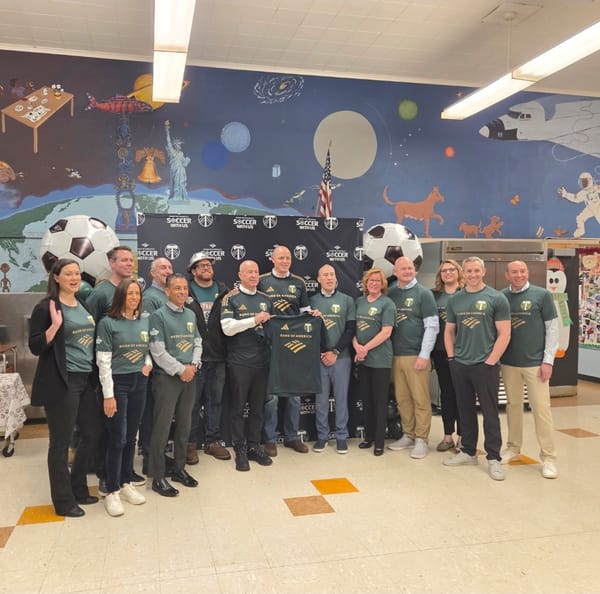An Immortal Victory
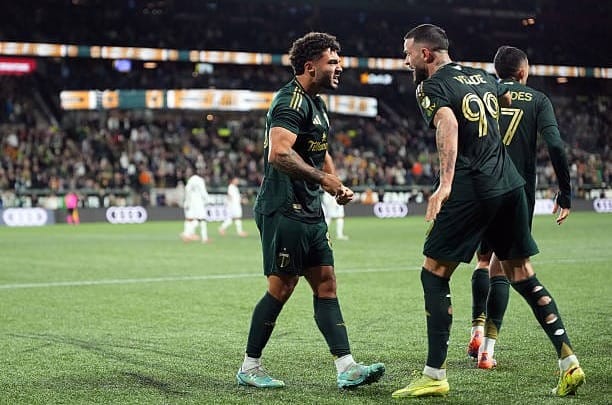
Where should I even start? How about with some facts? Game 2 of the First Round playoff series between the Portland Timbers and San Diego finished 2-2 at full time. In the ensuing penalty kick shootout, the Timbers prevailed 3-2. The final Timbers game at Providence Park in 2025 was an instant classic.
Recap
Kristoffer Velde did not want to lose this game. In the first five minutes, he was at the center of two big chances. Neither found the back of the net, but David Ayala’s first minute shot was on target. San Diego found their first chance of the night in the 14th minute from a set piece. Amahl Pellegrino’s free kick found the free head of Christopher McVey, but the San Diego center back put his header over the goal.
Three minutes later, the Timbers struck. James Pantemis played a long ball (awesome) for Antony to run onto. The sheer effort of the Brazilian got the ball into the box before he couldn’t hold it anymore. Velde was right behind him to recover the suddenly loose ball and fire it past CJ Dos Santos for his first home goal and a 1-0 lead. This was awesome. San Diego’s high line has been exploitable in every game this season, and the Timbers had some success against it in Game 1. In Game 2, they consistently attacked it, with Velde being the beneficiary of their direct assaults on San Diego’s last line of defense.
But everything stood still three minutes later. A diagonal ball to the back post was searching for Kevin Kelsy. Dos Santos tried to make a play, but Kelsy’s boot hit him in the head and he went down instantly. Juan Mosquera kept the play alive, and his cross hit Dos Santos in the head while he was down. It was clear that Dos Santos would have to leave the game, and he exited the stadium in an ambulance. Pablo Sisniega replaced him, and he was just cleared to play this week after suffering a head injury.
That stoppage took 9 minutes, and it allowed San Diego to get more of a footing in the game. Their pressure finally paid off in the 12th minute (out of 12 allotted) of first-half stoppage time. Corey Baird made a dangerous run through the middle of the pitch and received a through ball from Anders Dreyer. Pellegrino was lurking at the top of the box and received Baird’s next pass. Suddenly with tons of space around him, he picked out the postage stamp corner of Pantemis’ net to tie the game.
San Diego does this all the time. There’s a reason why they have the best road record in the league. They own high-leverage moments, especially at the end of halves. This phenomenon nearly struck again one minute after Pellegrino’s equalizer. Pantemis gave the ball away, and Pellegrino found Dreyer for a carbon-copy of a Decision Day goal. However, this unfortunate go-ahead goal was overturned by VAR for an offside violation. Cool. With a 1-1 score at halftime, each team entered the locker room with the belief that they could score the next goal and take control.
That second goal was scored by San Diego. In the 51st minute, Dreyer decided to copy the play that led to their second goal in Game 1. A diagonal out wide to Franco Negri allowed Dreyer to ghost into the box, where he volleyed the resulting cross. That shot was on target and it forced Pantemis to make a reactionary save, but the deflection fell right to Hirving Lozano. An easy point-blank finish gave San Diego the lead to commemorate Lozano’s return to the team. Tough, but the Timbers weren’t dead. They needed to find an equalizer.
That equalizer could’ve come in the 67th minute, but Omir Fernandez’s header was wide left on a feed from Velde. It could’ve come in the 74th minute, but Velde’s diving header was wide left on a feed from Felipe Mora. It could’ve come in the 88th minute, but Mora’s diving header was wide left on a feed from Ariel Lassiter. Put a mental sticky note on the timing of Mora’s missed chance. Ten minutes of game time later, in the 8th minute of second half stoppage time, number 88 got his opportunity.
Lassiter started the play by attempting a long throw. This was not a normal long throw because it didn’t act as a set-piece delivery. However, because most Timber corner kicks barely clear the first man, it kind of resembled a Portland set-piece delivery. Cristhian Paredes charged towards the ball but was bundled over by San Diego defenders. That allowed the ball to fall to Lassiter’s left foot, which sent the ball on a rainbow trajectory towards the back of the six-yard box. Gage Guerra, wearing number 88, rose above a crowd of bodies to head the ball into the net at the near post.
The crowd exploded. The sideline exploded. Providence Park hadn’t seen a scene like this since December 11th, 2021. An equalizer in a do-or-die playoff game with the last kick of regulation. A rookie from the University of Louisville (famous for Papa John [eww], Teddy Bridgewater [yay], World Series hero Will Smith [the catcher who hit a very big home run tonight, big day for the Cards] and a bird mascot with teeth [hell yeah]) saved the Timbers’ season. Three additional minutes of time followed, but the final whistle brought an instant penalty shootout.
Twelve Yards
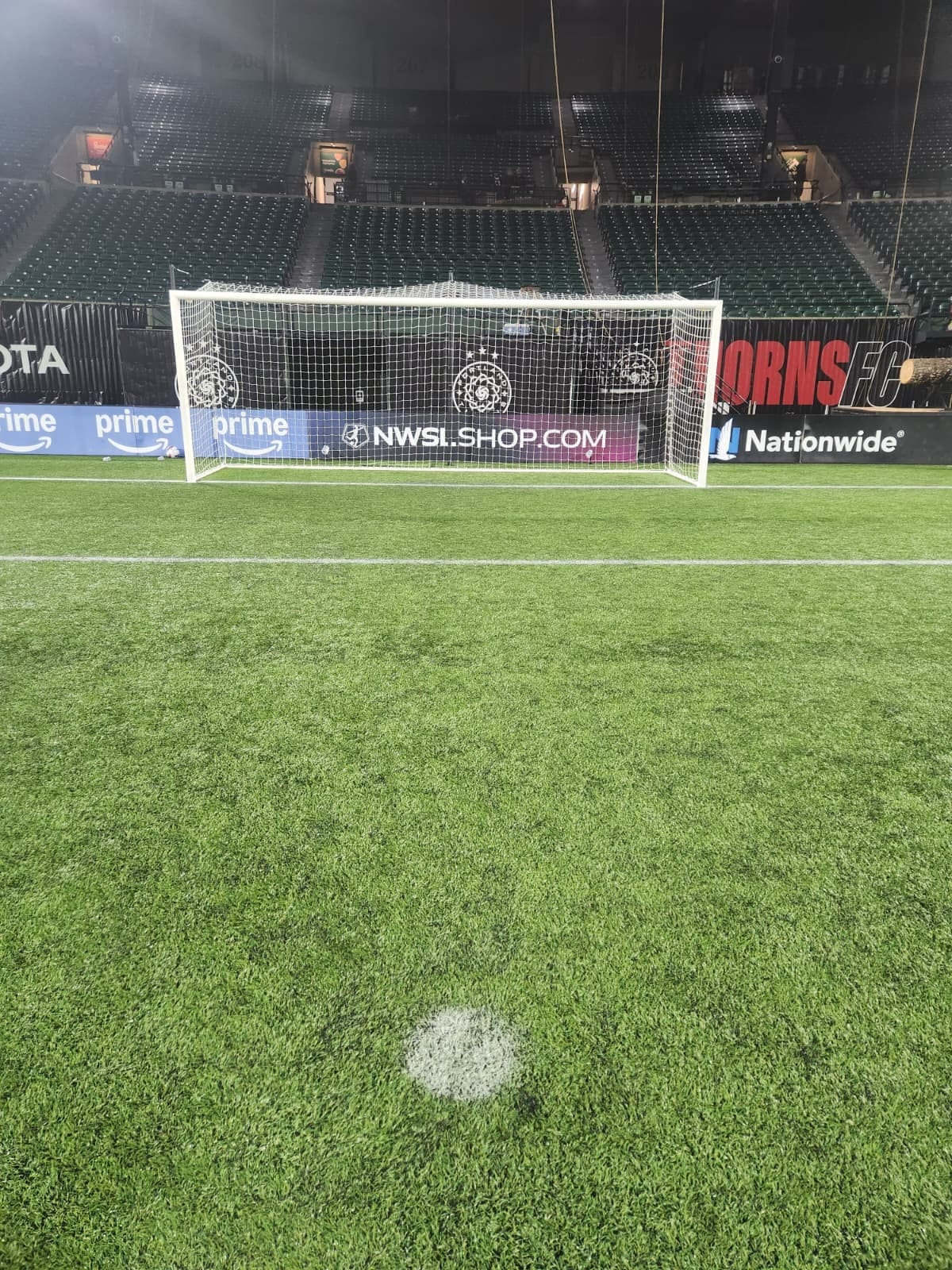
This is how Portland’s season would be decided. Four years ago, a title was decided from this exact spot with this exact view. Well, not this exact view, but that’s a technicality. Penalties are never decided by technicalities. Twelve yards separate the taker from his target. Either a player scores, or he doesn’t. Every penalty taker saw the ball, goal, and the crowd behind the goalkeeper. With that in mind, Dreyer stepped up to take San Diego’s first penalty and begin the shootout.
Dreyer’s kick found the back of the net, and Mora’s penalty was scored for a 1-1 tie after Round 1. Lozano took San Diego’s second and beat Pantemis. Paredes stepped up for the congruent kick, but his effort was right down the middle and easily stopped by Sisniega. Onni Valakari stepped up to try and give San Diego the two-goal advantage, but he sent his kick over the bar and into the North End. Fernandez had the opportunity to tie the shootout. He took a good penalty towards Sisniega’s right, but the substitute goalkeeper made the save and deflected it off the crossbar. The advantage stayed with San Diego. Then Marcus Ingvartsen stepped up, and ceded the advantage to Portland with another field goal.
Kristoffer Velde needed to score his penalty kick, so he did. Entering the 5th round, the score was knotted at 2. Now it was time for San Diego’s captain (Jeppe Tverskov) to take his pressure-packed penalty. His attempt banged off the crossbar. Antony made the long walk from midfield to the penalty spot with the opportunity to force Game 3. With a well-struck penalty to Sisniega’s right, he did just that.
TANGENT: Chargering
The Portland Timbers definitely Timbered in Game 1. In Game 2, it was San Diego’s turn to pay homage to the football team that deserted them.
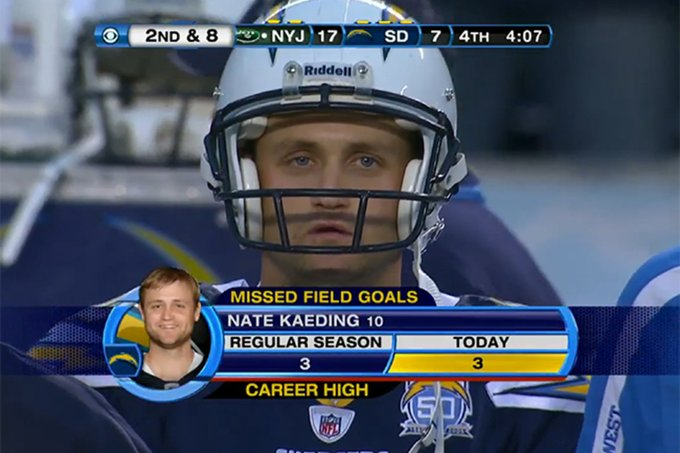
In 2010, the New York Jets returned to the playoffs under the stewardship of Rex Ryan. After dispatching the Bengals in the Wild Card Round, they had to travel to San Diego for the Divisional. This game ended 17-14, and Chargers kicker Nate Kaeding missed 3 crucial field goals that would’ve won the game for San Diego. The phenomenon of “Chargering” is a moniker for the ways that the Chargers can choke away a game.
Fifteen years later, San Diego got the three field goals that they desperately needed during that Divisional Round game. Unfortunately, they were playing the wrong kind of football. You absolutely have to hand it to them.
Recap, Continued
The Timbers (technically) handed San Diego their first road loss since May. They defended their home turf with a ferocity unseen in 2025 prior to tonight’s game. But what provided the platform for tonight’s success?
Out-Of-Possession
In the post-game presser, Phil Neville talked about a crucial training session.
“On Wednesday, we had a training session. I’d say that we started at 10 o’clock and by 11:20 the whole team had gone home. Why? Because they probably hated me because of the pressure I was putting on them in training. Because of the demands that I’d put on them in training. They were emotional. They were out of their comfort zone. They were arguing between themselves. On Wednesday we had to take them to places they’d never been. I went home that night and I asked them if they had major doubts with what we were trying to do and I said ‘I did too, but this is the only way we’re gonna get a result.’”
Wednesday training sessions are behind closed doors. In a normal matchweek, only two sessions (usually Tuesday and Thursday) are open to the media. Although I wasn’t in attendance for this, I can almost guarantee what they were working on.
In the span of one week, the Timbers revamped the principle behind their out-of-possession structure. A change in shape (from the 4-2-4 that I despise) was only part of it. Rather, this structure had no defined shape at all. It was entirely based on the opposition.
This sequence is awesome. Portland’s aggressive positioning and man-marking forces a risky pass through the middle of the field. Dario Zuparic comes to the edge of the middle third to make the interception. But the next part is what made this approach so effective. Instead of a zonal press that covered space, the Timbers were able to always be in contention for the second ball. David Da Costa simply has to be marking his man to win this ball that is created by Zuparic’s intervention. This idea forced the Timbers to constantly create 50/50s, but their positioning allowed them to win most of the resulting loose balls. Instead of relying on their reactions to win the ball like they’d have to do in a zonal system, their ability to be in the right spot gave them an upper hand. It’s simple, but brilliant.
Neville talked about overloads on Thursday. He specifically mentioned that the goalkeeper provides an overload in possession because they’re expected to act as another field player in buildup. This clip is justification of that thought process. Dos Santos is the only player on the field who doesn’t have a man-marker. So when he has the ball, Kelsy and Velde position themselves on the sides to cut off any passes to his center backs. But McVey and Manu Duah drop to the end lines, so Dos Santos is able to find them anyway. McVey opts to play a risky pass through the middle of the pitch (once again, the press is working because McVey has to play this ball quickly due to Kelsy’s encroachment). Corey Baird and Zuparic are locked in a 1v1, but Baird has the ball. He turns it over with a backpass. Unfortunately, Drew Fischer opts to call a soft foul on Zuparic which nullifies a potential Portland attack from great field position.
Wednesday’s training session had to be about this off-ball reset. It makes too much sense. This system can only work if every player is bought in. It sounded like they weren’t when Wednesday’s practice ended, but they were able to buy in on Thursday. This idea was perfect, and the execution was outstanding.
However, 12 minutes of first-half stoppage time allowed San Diego to exploit the first major crack in the new structure. No one tracked Baird’s run, and it put Portland’s backline immediately on the back foot. When Pellegrino receives the resulting pass, it’s like a miniature forcefield struck the defenders and they were forced backwards. None of them recovered to stop the shot. That goal was preventable, and it’s time to point to the canoe again. Switching off for only one second created this chance and, therefore, this goal. However, Portland’s canoe was very strong. They took the elements of the bull and paired it with their trusty vessel to create a perfect marriage between both modes of transport.
Player Ratings
James Pantemis: 7
Portland’s starting goalkeeper didn’t have much to do tonight. Unfortunately, most of his involvements were pretty average to poor. Aside from his long ball to Antony (where the Brazilian did most of the work) it was a sub-standard night for Pantemis. He didn’t save a single kick in the shootout. His 3 regular-time saves were pretty routine, and he nearly gave San Diego a second goal right before halftime. Aside from that blush, I liked his willingness to go long. Good change to the gameplan.
Juan Mosquera: 6.6
Mosquera was largely anonymous. He didn’t complete a single cross, but he did have a couple of good moments while holding up the ball along the touchline. Unfortunately, his most memorable moment of the match was hitting Dos Santos in the head while he was on the ground. Dos Santos did not deserve to have a Scott Sterling moment tonight, but he did anyway. Taking him off the pitch in the 68th minute was the right thing to do.
Finn Surman: 7.2
Would you like to watch Surman chase down a MLS Golden Boy?
That was pretty cool. It was his best moment of the night. Unfortunately, he was in the best position to close down Pellegrino on the Norwegian’s equalizer. Tough. Pellegrino also put him in a blender in the 64th minute. Tough. He was up to his usual tricks in the first half (blocking crosses and shots) but it wasn’t a mega-impressive outing for a player who has set such a high standard. He wasn’t bad, but the lowlights stood out more than the highlights.
Dario Zuparic: 8.1
The Croatian returned to the starting lineup and didn’t miss a beat. Most of Providence Park was unhappy with referee Drew Fischer tonight, but I’d like to thank him for something. Per my notes, Zuparic committed 5 fouls tonight. Most of them were soft (thanks to a floundering Corey Baird) but there is a world where Zuparic gets a first-half yellow card for persistent infringement. If I was a San Diego fan, and willingly bought a jersey with a police badge on it, I’d be furious about the lack of a persistent infringement booking. When Zuparic was yellow-carded in the 5th minute of second-half stoppage time, I thought it was his second yellow. However, it was his first. Congratulations to Drew Fischer.
As illustrated above, Zuparic was the key to Portland’s man-marking stability by relentlessly dueling Baird for the release ball. In addition, he was willing to launch long balls over San Diego’s high line. His performance wasn’t perfect but it certainly was good.
Kamal Miller: 8.5
Miller’s contributions to this game do not show up on the stat sheet. Despite some flawless counting numbers (1/1 long balls, 2/2 tackles, 2/2 dribbles) the basis for this grade is solely determined by his outstanding job of erasing Dreyer.
Sure, Dreyer was able to create a big chance that led to a goal, but Portland’s man-marking structure does not put the blame at Miller’s door for this. By the time Dreyer had moved centrally, he was supposed to be picked up by a different player. Throughout this game, Timbers players were constantly passing off marking assignments during San Diego’s dizzying off-ball runs. Once again, this provided a stark contrast to the previous meetings between the teams this year. It all goes back to the difficulty of that Wednesday training session; it’s very hard to consistently switch markers.
By heavily man-marking Dreyer in buildup and preventing him from receiving release passes, Miller effectively kept him from making a major impact in the first half. It was the right move to sub him off for Lassiter in the 79th minute with the Timbers pushing numbers forward in their pursuit of an equalizer.
Diego Chara: 9.5
This was the hardest game that Chara had to play this year. In typical Sonrisa fashion, he passed with flying colors.
While their out-of-possession shape was determined by San Diego, Portland’s in-possession shape was a 4-3-3. This is the best formation for a multitude of reasons, but it places a ton of weight on the player at the base of the midfield. Diego Chara is used to that weight, but throughout his Timbers career he’s always had a partner. Not tonight. With his sole focus on being himself, he simply did what he always does. This included a deserved yellow card, which might have been the only major decision that the crowd openly cheered (aside from San Diego’s second goal getting overturned on VAR). However, he also drew a yellow card of his own by beating Pellegrino to a long ball over the top and getting tackled in his own box in the 69th minute. Despite having to operate as a lone 6, he was spectacular.
David Ayala: 6.9
Ayala was pushed forward in Portland’s midfield, and he did a good job in the press. However, his on-ball contributions were a bit lacking. This included a couple shanked clearances and some turnovers. Maybe the 4-3-3 doesn’t cater to his strengths in the same way that a double pivot does. It was the right choice to sub him off in the 60th minute.
David Da Costa: 7.5
Portuguese Dave’s defensive effort stood out. He made several key recoveries high up the pitch and the free 8 role put him in the best spot to progress the ball. I liked a lot of what he did tonight, even though he only created 1 chance. His stock might be low right now due to the lack of output, but I’m still buying it for next season.
Kristoffer Velde: 10
The Portland Timbers have a new standard-bearer. This team will go as far as Kristoffer Velde takes them.
I’d like to echo John Strong’s immortal call of Larrys Mabiala’s game-winner on Thanksgiving Day in Colorado: “DIDN’T SCORE ALL YEAR! HE’S SCORED IN BACK-TO-BACK PLAYOFF GAMES!”
Based on his on-ball contributions, he deserves a 9 AT MINIMUM. However, this rating gets pushed to a 10 because of his most important duty of the night: leading Portland’s press.
He was constantly signaling to his teammates about their marking assignments. He took up the mantle as the leader of defense and leader of attack. His goal needed to happen. His penalty kick needed to be scored. There were so many things that the Timbers needed Velde to do tonight, and he did all of them.
Antony: 8
After a few lackluster performances, the Brazilian had a night to remember. Aside from calmly scoring the winning penalty, his motoring run created Velde’s goal. He was credited with an assist for it. Awesome. He created damage on the left and the right while defending with aplomb.
Kevin Kelsy: 8
Kelsy did find the back of the net in the 40th minute, but the flag was up for a pretty obvious offside. During the first half, he made every correct decision except one. It cost him a yellow, but it kept in line with Portland’s game-plan to commit extra shoves and pushes off the ball. Not foul-worthy, per se, but definitely not the most ethical. Kelsy got a little carried away with one of his, and got a yellow card for it.
Meanwhile, he acted as the target forward to win headers and was constantly flicking balls into space like Mora. It was pretty cool. However, two moments in this game need further attention.
Let’s start with the bad, but it isn’t Kelsy who makes this moment bad. He received a perfectly routine sideways pass on the right wing, but no player offered him any sort of support. While he stood there waiting for a passing option, none of his teammates showed for the ball. As a result, he had to pass it all the way back to Pantemis. Boos rang out. He was in a lose-lose situation. If he tried to dribble his way out of trouble and (likely) lost the ball, he would’ve been booed. However, he opted to keep possession but removed Portland’s attacking threat by playing a very long back-pass. It was the correct choice, and he got booed for it. Be nice to him. He put in a hell of a shift in the first half.
Part of his first half excellence was the funniest moment of the night. In the second minute of first half stoppage time, Ayala committed a pretty routine foul on Baird. However, Baird stayed on the ground to milk the clock. At this moment, Kelsy became a comedian.
The broadcast doesn’t pick it up. I’m furious. While Baird is on the ground in his dumbass haircut complaining to Fischer, Kelsy is making a substitution motion with his hands. I laughed a lot during this game. Sometimes for amazement, sometimes for joy, and sometimes for excitement. This was the only time that I laughed for something that was outright comedic. Kelsy divides a lot of the fanbase, and has somehow become a scapegoat. That’s ridiculous. A performance like tonight is a perfect building block for the young striker; filled with brilliance and shithousery.
Cristhian Paredes: 6.8
Paredes’ arrival brought energy and excitement. However, his on-ball skills continued to blunt Portland’s attacking thrusts. The Timbers needed his energy, so I’ll give him points for that. However, his penalty was easily the worst during the shootout.
Omir Fernandez: 9.3
That penalty miss was not his fault. It was a good attempt but was bettered by an excellent save. Fernandez’s performance in this game solidified my opinion about him: he’s an 8. He might be Portland’s best player when it comes to finding and exploiting space in the final third. The Timbers still struggle with that. His repeated thrusts into the box were often sacrificial, but they gave his teammates the chances to win the game. I could see a world where he starts next weekend, but he’s the best super-sub the Timbers have.
Ian Smith: 6.7
You have to feel for Smudge. He entered in the 68th minute, broke up a counter in the 77th minute, and didn’t really put a foot wrong. However, he was substituted off in the 82nd minute for Guerra. It was the right move, but it’s never easy to enter a game and then get subbed off for no fault of your own.
Felipe Mora: 7.3
Mora was very active after entering the game. He constantly probed San Diego’s backline looking for space, and he often found it in the right channel. That’s not a good shooting angle, but he made up for it by providing some good crosses. In addition, he buried his penalty kick.
Ariel Lassiter: 9
Neville brought him onto the pitch to provide service. He created two big chances, one of which resulted in the assist for Guerra’s miraculous equalizer. The other one was headed wide of the net by Mora. At the beginning of the season, I was extremely harsh on Lassiter. Boy, has he proved me wrong.
GAGE GUERRA: 100
We all needed that goal. Guerra simply gave the crowd something that they craved and something he'll forever treasure: a core memory.
No matter how this playoff run ends, his header is another page in a long chapter of memorable Providence Park goals. Matias Rojas didn’t make the bench tonight despite being off the injury report. Guerra was available in case the situation became desperate. His late equalizer at Starfire provided the platform for the Timbers to win their Open Cup game against the Tacoma Defiance. Tonight, his goal kept their season alive. “You have to be on your toes in every moment because you never know when you’ll get your last chance,” he said in the post-game presser. Portland’s last chance fell to him, but he wasn’t on his toes. His feet were in the air as he outjumped every surrounding defender to tie the game.
Coach Rating: 10
To be clear, this game ended in a 2-2 draw. The resulting penalty shootout did not affect this grade no matter how it ended.
From the opening whistle, the Timbers were in control. Neville’s work during the week to implement a new system and get the players to buy in worked wonders. He did not persist with trying to play it out from the back, and tweaked the system to play for the second ball down the field instead. These are good tactical changes, but they don’t bring the coach rating to a 10 by themselves.
The subs did that. Every single change was outstanding. Da Costa and Ayala faded a bit at the start of the second half, so Neville swapped the 8s for Fernandez and Paredes. Kelsy was on a yellow and his pressing wasn’t needed as the Timbers began to push the game into San Diego’s half, so Mora came on to find space and create/shoot. Smith also replaced an ineffective Mosquera at the same time. However, as the game wore on, Kamal Miller’s presence wasn’t needed, so he was swapped for Lassiter. For the final roll of the dice, Neville made the difficult decision to bring Smith off for Guerra. All of these players helped the Timbers keep a stranglehold on Los Plasticos during the second half, and it paid off with the last two substitutes combining for the equalizer.
This game proved something that I’ve been talking about all year: Neville is not a tactically inept coach. Sometimes his game-plans work, and sometimes they don’t. His lack of willingness to delve into his tactical setups is something akin to a college football coach. It’s easier to get an informative tactical quote out of the Pentagon than a college football team these days. Neville doesn’t want other teams to catch on to his ideas, so he’s often tight-lipped about them. I think that he doesn’t create the best game-plans sometimes, and the team is still really inconsistent in the mentality department. However, tonight was a game that they needed to have a perfect plan for. They had one, and they were able to keep their season alive.
Bracket Time
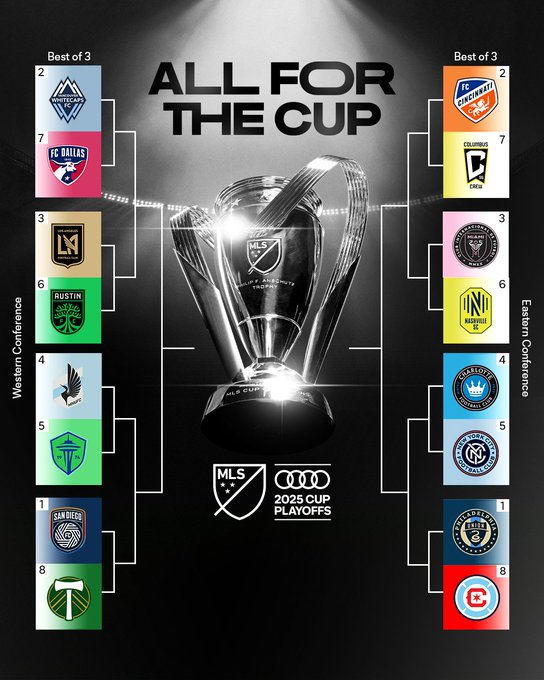
The Timbers have earned the right to play in Game 3. Four other playoff games occurred today. Philadelphia and Vancouver won their Game 2s (against Chicago and Dallas, respectively) and are the first teams to qualify for the Conference Semifinals. Charlotte beat NYCFC in a penalty shootout (very nice) to force Game 3. Nashville was able to protect a 2-0 lead (it ended 2-1, Messi is inevitable) and they have earned a trip to South Beach for Game 3 as well. Congratulations to them.
Final Whistle
This was the final game at Providence Park during 2025, and the Timbers delivered. Phil Neville said it best post-game: “I think we owed our supporters that kind of performance….They were sucking the ball into the net for us.”
There is no place on Earth like Providence Park. Next year, it will turn 100 years old. Most MLS teams play in a flashy soccer-specific stadium that was designed by the same architecture firm. In terms of the pre-MLS clubs (San Jose, Vancouver, and Seattle) the Timbers are the only ones who still play in the venue that hosted their first ever competitive match. That’s special, and everyone knows it.
The Timbers haven’t had a night like this in a while. The obvious comparison is the Double Post game, but I don’t think that one can be topped. Comparing this to other games misses the point of tonight entirely. What the Timbers needed, more than anything, was a release.
Gage Guerra headed home the most clutch goal since Felipe Mora’s immortal equalizer in MLS Cup. This time, they finished the job in the shootout. In the preview article for this match, I discussed the immense frustration that Timbers fans have had during home games this year. Many of those same traits appeared tonight. Anger at the referee (who should’ve sent Chris McVey off with a second yellow card), crucial missed chances, and bewildering moments. This entire year at home was merely set-up for tonight.
While I was making my way down to the service level for the post-game press conferences, I paused at one of the lookout decks from the press level. I didn’t have my phone out for any of the penalty kicks or goal celebrations. This was the time to capture the night.
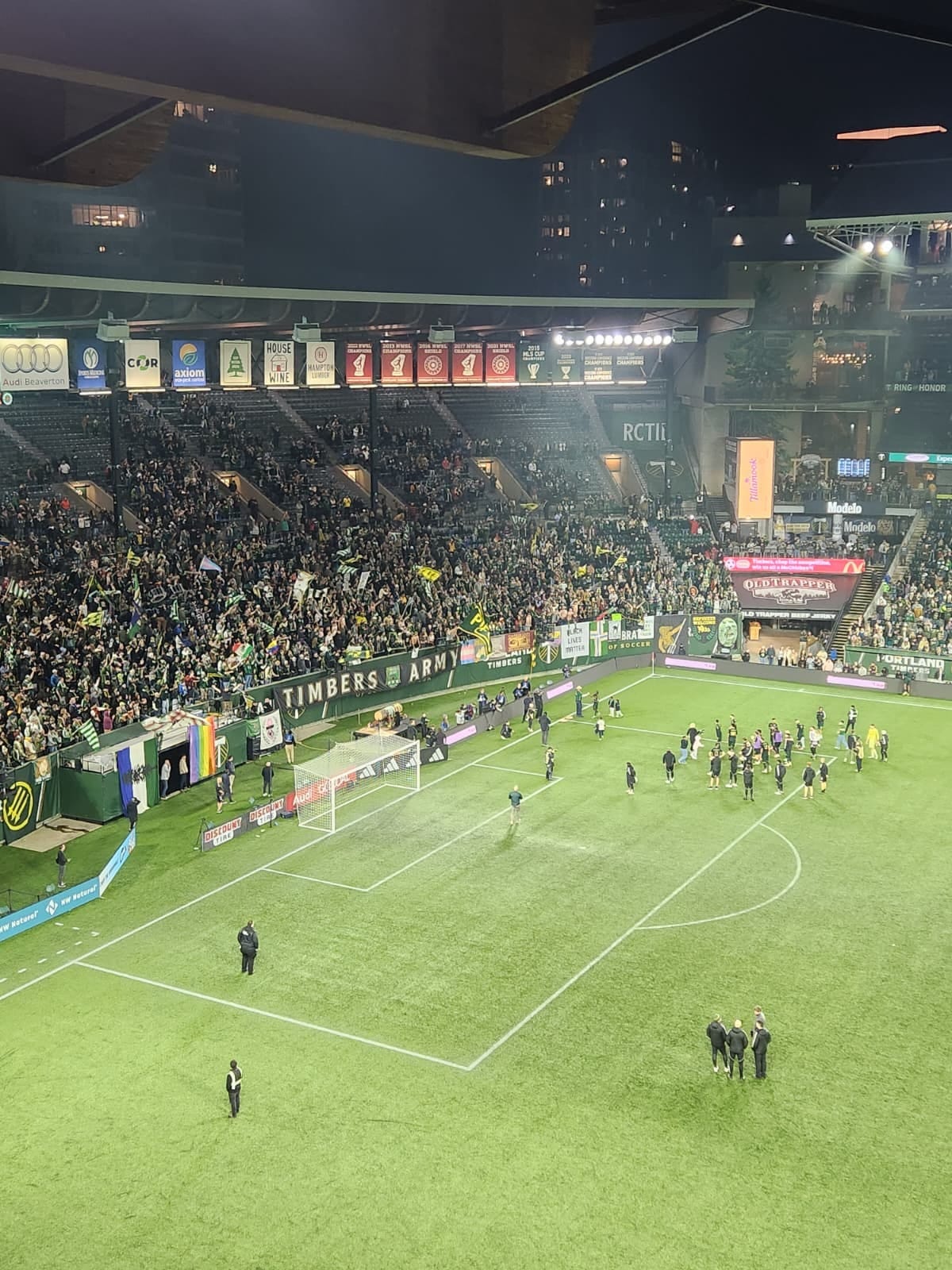
A moment like this isn’t unique to tonight. If you ignored the color of the jerseys or all the banners (plus the renovated East Side) this picture could be from 1975, 2011, or 2025. It shows a victorious home team celebrating in front of the North End.
On January 23rd, 1975, Portland was awarded a NASL franchise. One day later, general manager Don Paul hosted the first Timbers press conference. Soccer was barely starting to register in America, yet Paul had a bold proclamation for the town that would become Soccer City USA: “Hopefully, we are here forever.”
That quote is immortal. Much like the various moments that the Timbers have shared with their fans throughout their fifty years. However, tonight could’ve ended in a different manner, with a different expansion team that exists due to the death of another one ending Portland’s season on their home field. These Timbers had one more game at Providence Park during their 50th anniversary. They had to win, and they did.
November 1st is a critical day in Timbers history. In 1982, the team was owned by the Louisiana-Pacific corporation. Those owners did not believe that soccer would survive in Portland, and they wanted to sell the team. After the league office prohibited them from moving the team to another city, Louisiana-Pacific had to find a buyer or they would dissolve the team. A buyer (local businessman James Horne) made an offer in early October, and the league approved the deal. However, on October 21st, Horne backed out of the deal. The team folded on November 1st, 1982. Paul’s proclamation about the immortality of the Timbers project was false. But he was mistaken. He wasn’t talking about the NASL Timbers. He was referring to the Timbers as an idea, not an entity.
Two more editions of the Timbers followed, with the third becoming the current iteration of the team. Paul’s quote was tested on November 1st, 1982. On November 1st, 2025, 43 years after the NASL Timbers ceased to exist, the Portland Timbers secured their right to survive. They are immortal. They will be here forever. And as long as they exist and survive, Paul will never be wrong. His hope is no longer a hope. It’s a certainty.
That’s what I was thinking about when I took that picture. A timeless photo celebrating the union between supporter and player. A bond that will not change although the subjects will. Generations of Timbers fans have sat in the stands of Civic Stadium and watched this team win soccer games. Tonight’s game was something that could only be accomplished in Portland. The enduring struggle for an immortal team to keep Paul’s proclamation alive in a venue that will be 100 years old when Timbers fans pour through the gates in 2026. This is how Year 50 needed to end at Providence Park. A cathartic victory that sent Timbers fans streaming onto Morrison Street in utter joy like they’ve done for 50 years. No other club can do it like that.
Saying goodbye to Providence Park after every season is something I never look forward to. Since 2021, every final game at the stadium has made me want to abandon the site immediately. From a dazed walk down Morrison Street on a cold December afternoon in 2021 to a morose trot onto the concourse in 2023, even last year’s long climb to the pressbox after a humiliation unseen in Timbers history, I left Providence Park with a feeling of loss. Tonight, I tried my hardest to stay as long as I could. After the press conference, I walked up to the pressbox from the field to record a joyous podcast with my colleagues from different outlets. Then I wandered back down to the field to take in a view that the team experiences. I didn’t want to leave. Eventually, I did. Doesn’t matter. I will be there forever.
Game 3 is next Sunday, and the Timbers are heading into it with all the momentum. Allowing a late equalizer and missing 3 straight penalties are absolute gut-punches to a team that hasn’t taken a punch like that (not even multiple) in their brief history. Portland is still playing with house money, and they’ve given their supporters an eternal victory. These victories always stand out no matter when the end of the road comes. At the very least, the Timbers will have this win. But the job isn’t finished. They put their opponent on the ropes and have the ability to apply the knockout blow. Landing that blow will be tough. The remainder of their season will take place away from their timeless home. Everything is on the line on Sunday night. The voyage continues.



